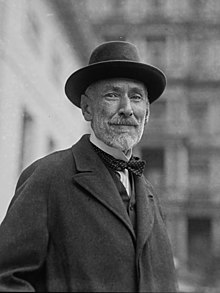Irish Dominion League
Irish Dominion League | |
|---|---|
| Leader | Sir Horace Plunkett |
| Founded | 1919 |
| Dissolved | 1921 |
| Merger of | Irish Centre Partyand Irish Reconstruction Association |
| Newspaper | Irish Statesman |
| Ideology | United Ireland Irish unionism |
| Political position | Centrist[1][2] |
TheIrish Dominion Leaguewas an Irishpolitical partyand movement in Britain and Ireland which advocatedDominionstatus forIrelandwithin theBritish Empire,and opposedpartition of Irelandinto separate southern and northern jurisdictions.[3]It attracted modest support from middle-class Dubliners of moderateunionistandnationalistbackgrounds, anxious to achieve a compromise in the face ofthe escalating conflictbetween theIrish Republican Armyand the British.[4]It operated between 1919 and 1921.
History of the League[edit]

The League was launched in June 1919 bySir Horace Plunkett,with a 12-point manifesto signed by Plunkett and 43 others,[5]including many who had participated in theIrish Conventionof 1917–18 and severalAnglo-Irishmembers of theHouse of Lords.[6][self-published source][7]Plunkett had founded the Irish Reconstruction Association at the time of theNovember 1918 election,after the failure of the Irish Convention. The new League merged the Irish Reconstruction Association with theIrish Centre Party,[8]founded months earlier byStephen Gwynn,formerly of the pro-home ruleIrish Parliamentary Party.[9]TheUnionist Anti-Partition LeagueofSt John Brodrick, 1st Earl of Midletondiscussed joining but decided the platform was too nationalist.[10]The founders also approachedJohn Dillonbut were rebuffed.[9]Many of the League's senior members were drawn from theIrish Agricultural Organisation Society.
The manifesto was based on an earlier "Proposals for an Irish Settlement" drafted anonymously by Diarmuid Coffey and Frank Cruise O'Brien (father ofConor Cruise O'Brien).[9]The chairman of the London committee of the League,Thomas Spring Rice, 2nd Baron Monteagle of Brandon,introduced a Dominion of Ireland Bill in the House of Lords in 1920 in line with the League's views.[11]The debate surrounding the proposed bill helped to raise the prominence of the League, although it failed to gain support in the British parliament.[12]Monteagle's bill was defeated at second reading on 1 July 1920 and the government ofDavid Lloyd Georgeproceeded instead with its own bill, which became theGovernment of Ireland Act 1920.The League was dissolved in November 1921 following the establishment of theIrish Free State.[13] In 1922 Warre B. Wells wrote, "The Irish Dominion League did not attract a great deal of active support in Ireland, but it was hardly expected to do so inasmuch as it was chiefly a propagandist organisation".[14]Within Ireland, the moderate position of the League failed to convince sufficient members of either the unionist or nationalist communities to support its position. At Westminster, the League's small group of supporters were caught between the more numerousLiberals,who believed that the partition of Ireland should take place, and theConservatives,who argued against any home rule for Ireland.
Irish Statesman[edit]
TheIrish Statesman,a weekly journal promoting the views of the Irish Dominion League, ran from 27 June 1919 to June 1920.[15]It was edited byWarre B. Wells,with contributions fromW. B. Yeats,George Bernard Shaw,andGeorge William Russell.[16]The League's manifesto was first published in the journal's first issue.[17]The title was revived in 1923, after the League was defunct, with the new series running till 1930.
References[edit]
- Wells, Warre B. (1922).Irish Indiscretions.London: Allen & Unwin.
- ^Smith, N. (2006).A 'Manly Study'?: Irish Women Historians 1868-1949.Springer. p. 69.
- ^Moulton, Mo(2014).Ireland and the Irish in Interwar England.Cambridge University Press. pp. 52–53.
- ^John Kendle,Ireland and the Federal Solution: The Debate over the United Kingdom Constitution, 1870-1920(McGill-Queen's Press - MQUP, 1 Jan 1989), 231.
- ^Richard Bennett,The Black and Tans(Pen and Sword, 10 Nov 2010), 195.
- ^Gaughan, J. Anthony (1989).Alfred O'Rahilly.Vol. 2. Kingdom Books. pp. 60–61.ISBN978-0-9506015-7-1.
- ^Desmond Keenan,Ireland 1850-1920(Xlibris Corporation, 11 May 2005), 472.
- ^Wells 1922, p.92
- ^Colin Reid, 'Stephen Gwynn and the Failure of Constitutional Nationalism in Ireland, 1919 - 1921',The Historical Journal,53, 3 (2010), pp. 723–745
- ^abcWells 1922, pp.89–90
- ^Wells 1922, p.90
- ^ "DOMINION OF IRELAND BILL. [H.L.]".Parliamentary Debates (Hansard).Lords. 22 June 1922. "DOMINION OF IRELAND BILL. [H.L.]".Parliamentary Debates (Hansard).Lords. 1 July 1922.
- ^D. George Boyce, Alan O'Day,Defenders of the Union: A Survey of British and Irish Unionism Since 1801(Routledge, 4 Jan 2002), 153.
- ^Hancock, William Keith; Latham, Richard Thomas Edwin (1967).Survey of British commonwealth affairs.Vol. 1. Oxford University Press. p. 129.Retrieved6 February2011.
- ^Wells 1922, p.93
- ^The Western Argus(Tuesday 9 September 1919)http://nla.gov.au/nla.news-article34211372
- ^Allen, Nicholas (2003).George Russell (AE) and the new Ireland, 1905-30.Four Courts Press. p. 139.ISBN978-1-85182-691-9.
- ^Wells 1922, p.88
